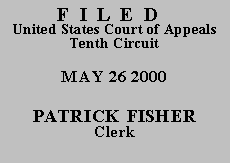

| EVELIO DUARTE-VESTAR,
v.
RICK L. HUDSON |
No. 99-6423
(D.C. No. 98-CV-1331-T) |
Mr. Duarte-Vestar was convicted of a misdemeanor in Wisconsin. The Wisconsin Department of Corrections, pursuant to a contract with the Corrections Corporation of America, shipped Mr. Duarte-Vestar to the North Fork Correctional Facility in Sayre, Oklahoma. The North Fork facility houses medium security felons. Although Wisconsin authorizes the housing of inmates convicted of misdemeanor offenses with those inmates convicted of felony offenses, that practice is generally prohibited in Oklahoma. See 57 Okla. Stat. Ann. § 563.2(D)(1) (Supp. 1998) ("A private prison contractor housing . . . inmates of another state shall not accept: Any inmate who would be incarcerated in the facility for a misdemeanor unless such incarceration in the facility is consistent with American Correctional Association requirements relating to the incarceration of inmates convicted of more serious offenses."); Affidavit of Warden Hudson, at ¶ 3 ("According to Oklahoma Law 57 O.S. 563(D)(1) and American Correctional Association . . . standards, private prisons may not house any inmate who would be incarcerated in the facility for conviction of a misdemeanor."). Shortly after Mr. Duarte-Vestar arrived at the North Fork Correctional Facility, Warden Hudson contacted the Wisconsin Department of Corrections to notify them that he could not house misdemeanor inmates with the felony inmates at North Fork. See Aple. App. at 19-20. Wisconsin initiated efforts to remedy the problem by removing the misdemeanor inmates from the North Fork Correctional Facility. See id. at 20. In the interim, Warden Hudson arranged for Mr. Duarte-Vestar and other transferred misdemeanor inmates to be held separately from the general population at the prison. See id. Mr. Duarte-Vestar's property was seized and he was placed in administrative segregation from September 4, 1998 to September 14, 1998. See id. at 17. He was then transferred back to a Wisconsin facility.
Mr. Duarte-Vestar instituted an action in the district court pursuant to 42 U.S.C. § 1983, alleging that his administrative confinement and the seizure of his property violated his constitutional rights. Warden Hudson filed a motion to dismiss together with the court-ordered Martinez report.(1) The Magistrate Judge issued a Report and Recommendation, suggesting that Warden Hudson's motion to dismiss be granted, and that the complaint be dismissed as to all defendants for failure to state a § 1983 claim upon which relief can be granted pursuant to Fed. R. Civ. P. 12(b)(6) and as frivolous pursuant to 28 U.S.C. § 1915(e)(2)(B)(i). The district court adopted the Magistrate Judge's Report and Recommendation.
We may rely on a Martinez report in dismissing a claim as frivolous as long as the report's factual findings are not controverted. See Hall v. Bellmon, 935 F.2d 1106, 1109 (10th Cir. 1991). Mr. Duarte-Vestar has not controverted the facts set forth in the Martinez report, and has not challenged the asserted reason for the actions taken by the prison, which was to protect Mr. Duarte-Vestar from the more violent felony inmates.
Having considered Mr. Duarte-Vestar's allegations, the Martinez report, and the record on appeal, we agree with the Magistrate Judge's Report and Recommendation and the District Court order. Mr. Duarte-Vestar's placement in administrative segregation was not an imposition of punishment. He was still allowed access to all programs and privileges offered to the general population. There was no constitutional deprivation. Therefore, we AFFIRM the dismissal of the action pursuant to Fed. R. Civ. P. 12(b)(6) and 28 U.S.C. § 1915(e)(2)(B)(i) and (ii). Mr. Duarte-Vestar must continue making payments on his filing fees until they are paid in full.
ENTERED FOR THE COURT
David M. Ebel
Circuit Judge
*.After examining appellant's brief and the appellate record, this panel has determined unanimously that oral argument would not materially assist the determination of this appeal. See Fed. R. App. P. 34(a)(2) and 10th Cir. R. 34.1(G). The case is therefore ordered submitted without oral argument. This Order and Judgment is not binding precedent, except under the doctrines of law of the case, res judicata, and collateral estoppel. The court generally disfavors the citation of orders and judgments; nevertheless, an order and judgment may be cited under the terms and conditions of 10th Cir. R. 36.3.
1.See Martinez v. Aaron, 570 F.2d 317 (10th Cir. 1978).